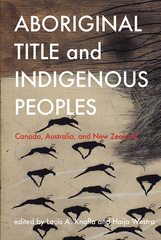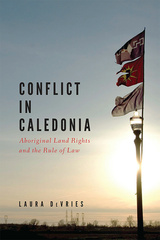
Ghost Dancing with Colonialism
Decolonization and Indigenous Rights at the Supreme Court of Canada
Some assume that Canada earned a place among postcolonial states in 1982 when it took charge of its Constitution. Yet despite the formal recognition accorded to Aboriginal and treaty rights at that time, Indigenous peoples continue to argue that they are still being colonized.
Grace Woo assesses this allegation using a binary model that distinguishes colonial from postcolonial legality. She argues that two legal paradigms governed the expansion of the British Empire, one based on popular consent, the other on conquest and the power to command. During the twentieth century, international law formally rejected the conquest model. However, despite the best intentions of lawyers and judges, the beliefs and practices of the colonial age continue to haunt Supreme Court of Canada rulings concerning Indigenous rights.
The binary analysis applied in Ghost Dancing with Colonialism casts explanatory light on ongoing tensions between Canada and Indigenous peoples, suggesting new ways to bridge the cultural divide and arrive at a truly postcolonial justice system.
This book will appeal not only to activists, lawyers, and the judiciary but also to scholars in law, Native studies, and postcolonial studies.
This book has impressive scholarly depth, and in a systematic and challenging way makes a major contribution to understanding and assessing the Supreme Court’s decision-making with respect to Aboriginal peoples in the quarter century since Aboriginal and treaty rights have been formally recognized in Canada’s Constitution.
Introduction: Ghost Dancing and S. 35
Part 1: Paradigms and the British Empire
1 Anomalies
2 Conceptual Structures
3 Colonial and Postcolonial Legality
Part 2: Case Study: Indigenous Rights and Decolonization at the Supreme Court of Canada
4 Methodology
5 Internal Architecture of the Court’s Reasoning
6 Trends and Dance Tunes
7 Can the Court Become Postcolonial?
Appendix 1: Chronological List of Cases Studied
Appendix 2: Judicial Careers
Appendix 3: Judicial Reasoning Profiles
Appendix 4: Assessment of Reasoning
Appendix 5: Use of the Canadian Judicial Institution
Notes
Selected Bibliography
General Index
Index of Cases
Index of Legislation, Treaties, and Accords













